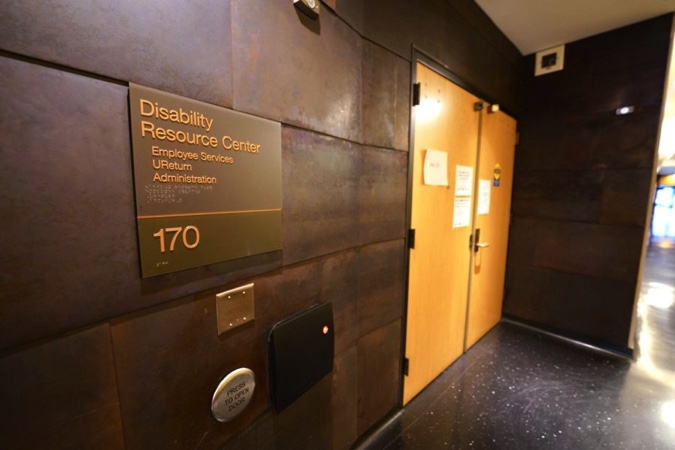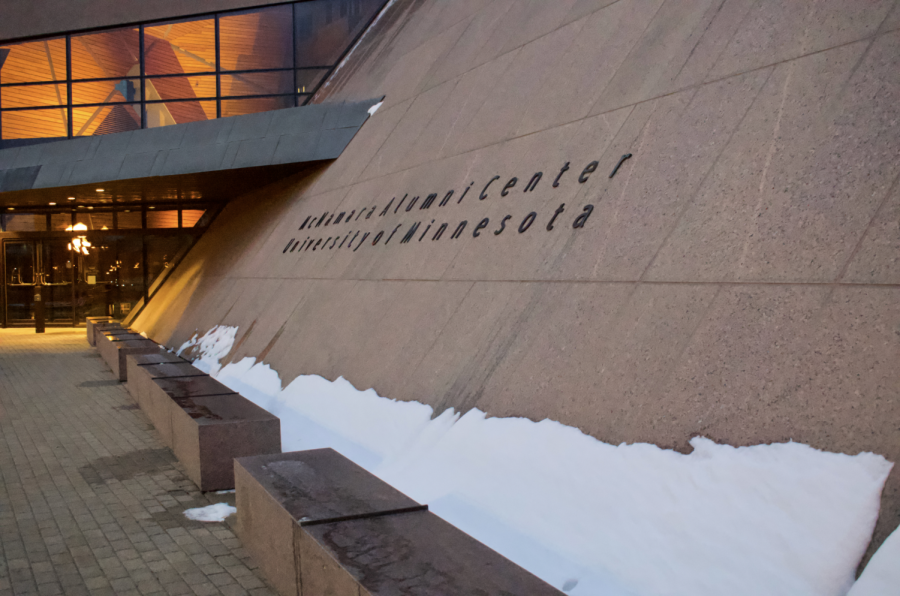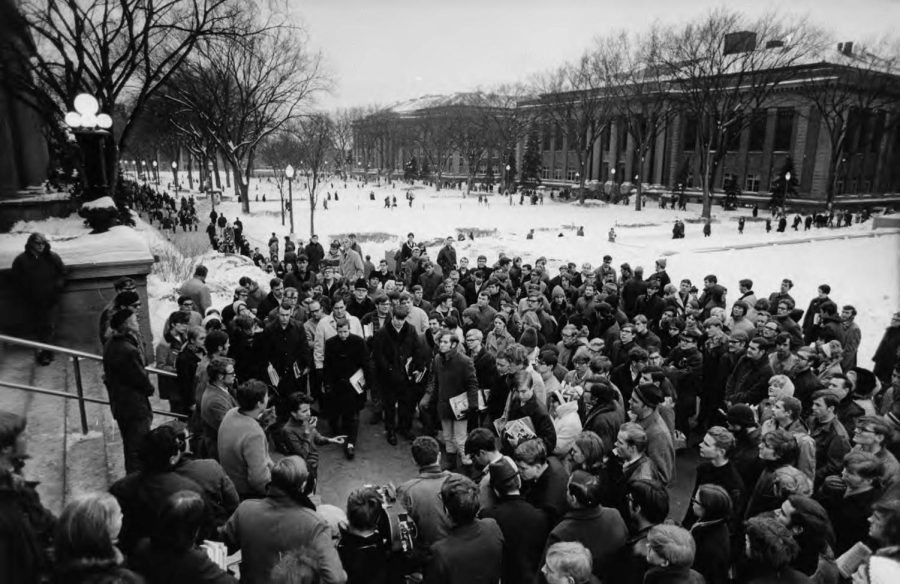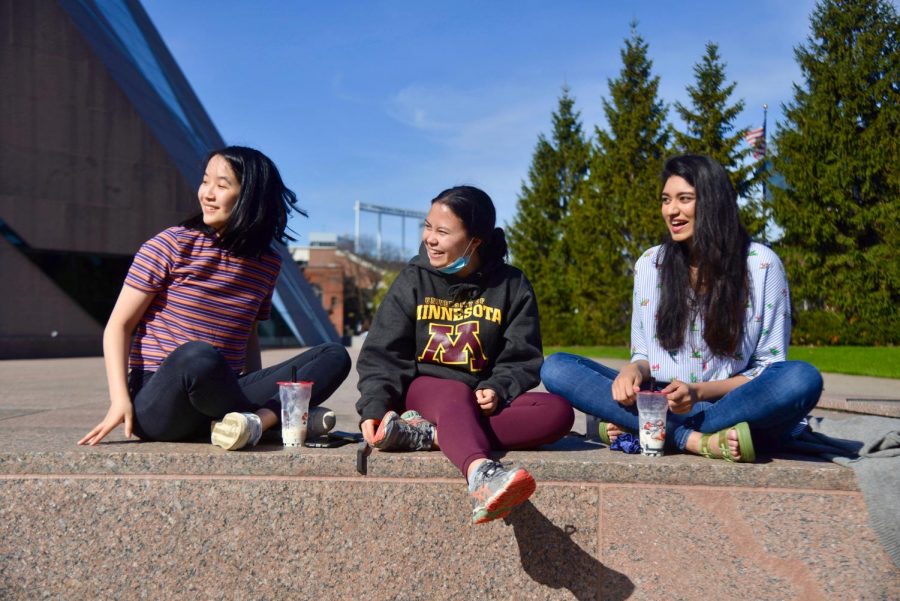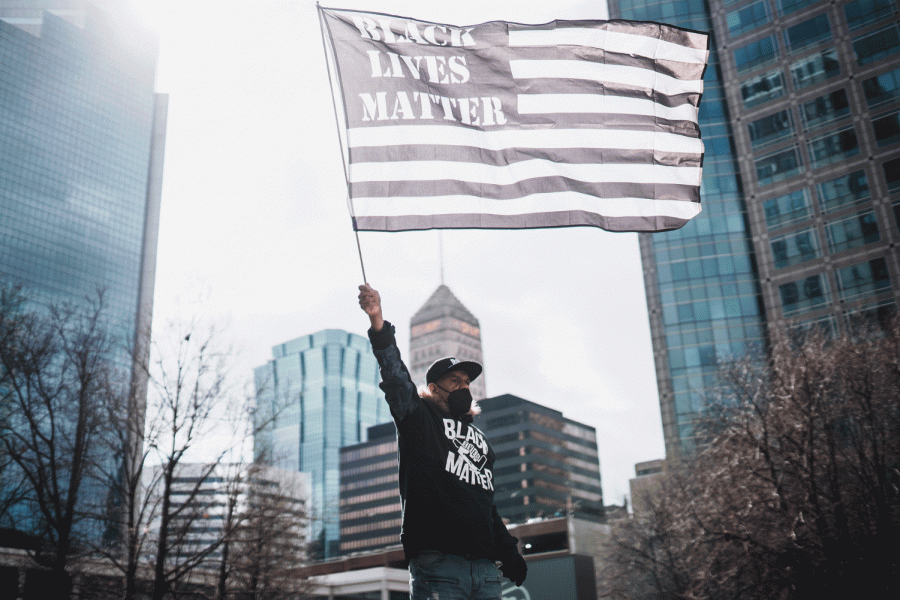This article is part of a series on sexual assault at the University of Minnesota.

For a week, the two chatted about school and their mutual greek life connection. They planned a date on a Friday night in mid-October — and she told him she wasn’t interested in sex.
But when Ortmeier-Clarke’s perpetrator arrived at her apartment in Stadium Village, he smelled of alcohol and stumbled over his words.
Ortmeier-Clarke said she was sober at the time. She told him to go home, but he was forceful, she said, so she decided to let him sleep at her apartment until he sobered up.
“I went to the bathroom, and I came back out, and he was standing there naked. It was a lot of shock,” Ortmeier-Clarke said.
He kissed her and took off her clothes. She told him she didn’t want to proceed, but her assailant forced Ortmeier-Clarke to perform oral sex on him. She said she pulled at his hair, but he pinned down her arms.
Then, she said he raped her.
She remembers him saying, ‘You know you want this. Loosen up. Just enjoy it.’
Ortmeier-Clarke rolled up in a ball, drifting in and out of sleep. She said she woke up to her assailant raping her again.
In the morning, a friend texted Ortmeier-Clarke and asked how the date went. She responded: “It was fine.”
Five months later, she took her case to the University of Minnesota with the hope that she’d find resolution.
The school eventually found Ortmeier-Clarke’s perpetrator responsible for the assault and decided to withhold his diploma until she graduates in 2018.
Following policy changes at the University, sexual assault reports doubled between fiscal year 2014-15 and 2015-16.
Still, some victims say they struggle to report their assaults for fear of retraumatization.
“We know that this is the most underreported crime. One of the big reasons it’s so underreported is because those survivors feel they won’t be believed,” said Jeanne Ronayne, director of the Minnesota Coalition Against Sexual Assault and Rape.
Women who were sexually assaulted say they endure post-incident distress, self-denial, holes in memory, mental health issues and lost friendships.
Still, they find ways to cope.
Ortmeier-Clarke sought help from Aurora Center advocates. And in May 2018, she’ll graduate with a degree in plant science.

Fighting for her worth
Women who have reported their assaults to the University say telling their stories can be just as difficult as living them.
Though the percent of falsely reported sexual assault mirrors that of other crimes — 2 to 10 percent, Ronayne said — cases are difficult to prove, and victims often feel doubted.
For Kayla Pederson and Maria, two women who were assaulted by members of Delta Upsilon in 2015, discombobulated memories of their assaults became a point of contention during University disciplinary hearings.
“That’s what’s been hard about the whole thing, is not being able to trust my own memory,” said Maria, who asked to be identified by first name only.
A University panel expelled Pederson’s assailant after finding him responsible for Maria’s assault, too.
“There’s a lot of waiting. It really eats at you,” Pederson said. “It’s just a lot of agony because when you don’t report it, you just put it in a box and don’t look at it. But then when you do report it, you can’t take it back.”
Pederson said she had to “fight for [her] worth in the system.”
Ortmeier-Clarke reported her assault to the Minneapolis Police Department in January 2016, three months after it took place, she said.
But after filing her case, Ortmeier-Clarke didn’t hear from an investigator. She said she called the special crimes investigation division, which informed her that she would need to submit a rape kit.
When Ortmeier-Clarke told an investigator she completed a kit the night of her assault, the investigator said it must have gone missing.
Ortmeier-Clarke was ready to relinquish all hope of criminal prosecution in her case, but in March another investigator contacted Ortmeier-Clarke to interview her about her rape.
The officer met with Ortmeier-Clarke and an Aurora Center advocate in March 2016.
“The last conversation between the Aurora Center and [the officer] was ‘Well, [the perpetrator] said it was consensual, so there’s no other evidence pointing any other way,’” Ortmeier-Clarke said. “At that point … I was feeling angry.”
For Abby Honold, a University student who immediately called police and underwent a rape examination after her assault in November 2014, justice took two years.
Despite sustaining bruises and lacerations, Honold had to fight for a conviction for her rapist, former University student and Sigma Phi Epsilon member Daniel Drill-Mellum.
Drill-Mellum was sentenced to six years in prison last August, after the University found him responsible for the assault and two separate investigators pushed to open — and later, reopen — Honold’s case.
The aftermath
The University’s Aurora Center lists denial, loss of control, guilt, anger and post-traumatic stress disorder as symptoms sexual assault victims might face.
Maria denied her assault was “that bad” for eight months before reporting it to the University.
“I Googled ‘Was I raped?’” Maria remembers.
In the months after her assault, Maria returned home for summer break and tried to block the incident from her memory. But when she had no desire to return to campus, she said she began to realize something was wrong.
“During freshman orientation, when they have the girl talk about how her sexual assault affected her and how she was sad all the time, I was just like … ‘I can’t, I don’t have time for this,’” Maria said.
Leading up to December 2015, when she filed a report with the University, Maria said she felt depressed and suicidal.
Anishaa Kamesh, a genetics, cell biology and development senior, kept her story a secret to close friends and relatives for a year.
“I pretended it didn’t happen. I didn’t want to accept that something that horrible could have happened to me,” Kamesh said. She said she was allegedly assaulted during a fraternity house party in the spring 2015.
“It definitely felt like I had lost my purpose and identity,” she said.

Honold still suffers from PTSD as a result of her assault. She said she has to practice better self-care and can no longer engage in things she used to love — like teaching young, loud elementary school children.
About 94 percent of women experience PTSD symptoms for two weeks after their rape. Thirty percent experience those symptoms nine months later, according to the Aurora Center.
“I get jealous of friends of mine who are having a great college experience and still getting to go out and have fun,” Honold said. “I think of everything as a danger to myself. I think that’s kind of what PTSD does to your brain, is that everything is scary all of a sudden. Everything is a threat.”
Moving forward
Since Drill-Mellum’s guilty conviction, Honold has become a vocal advocate for sexual assault victims. At the University and nationwide, Honold has used her experience to speak up for those who don’t feel they have a voice, she said.
“It took me a couple days to really give myself the permission to be like ‘This is going to change things, and you need to start taking care of yourself now,’” Honold said.
After her assault, Maria blamed herself for being drunk, for remaining silent, for being “in the wrong place at the wrong time.”
In an unsent letter to her assailant, Maria told him she felt “violated and icky in a way that I couldn’t wash off in the shower.” She just wanted a good cry and to feel angry, she wrote.
“I have to pay, why don’t you?” Maria wrote.
Maria said she was happier before her assault. She had dreamt of coming to the University of Minnesota — a school she is now excited to leave.
Pederson, too, felt more carefree. “Life just seemed less heavy,” she said.

And while the women were allegedly assaulted by fraternity members, they say they have struggled to find support within the University’s greek community.
Of 305 reports at 104 schools nationwide, 10 percent of perpetrators were fraternity members, according to a 2015 report by United Educators Insurance.
“I see a culture of not supporting survivors,” said Honold, who was disinvited — and later re-invited — to a speaking event at the University greek community’s sexual assault awareness event, Walk A Mile In Her Shoes. A member of the committee originally texted her saying her appearance might “cause more harm.”
Simon Beck, president of the Interfraternity Council, said that text message was sent without communication between IFC and Panhellenic Council leaders.
Despite their belief that University greek life needs to take a stronger stance against sexual assault and improve education on consent and bystander prevention, the women have found healing through other channels.
For Ortmeier-Clarke, reminding herself that each day is a fresh start and her assault doesn’t have to define her has been key in moving forward.
Ortmeier-Clarke, Pederson and Maria all attend a support group at the Aurora Center.
Maria and Pederson met under what they call unfortunate circumstances, but the two have become close friends and have found common ground outside their mutual offender and traumatizing experiences.
“Before this happened, I was an optimist. I’m still an optimist,” Maria said. “I’ve been working on trying to be thankful for what I can do, what I have and the people around me.”



